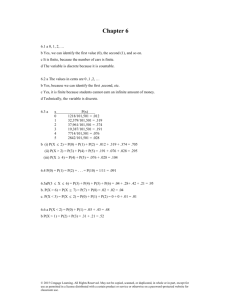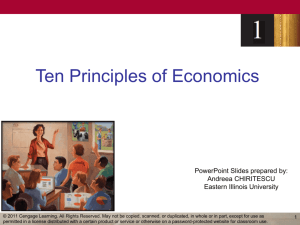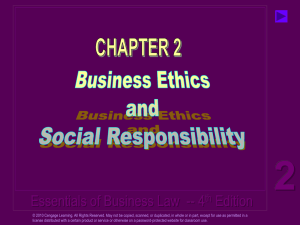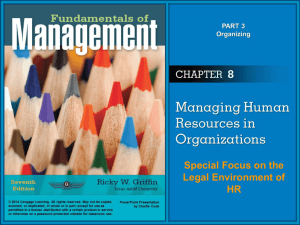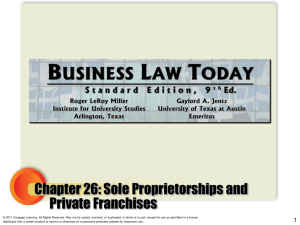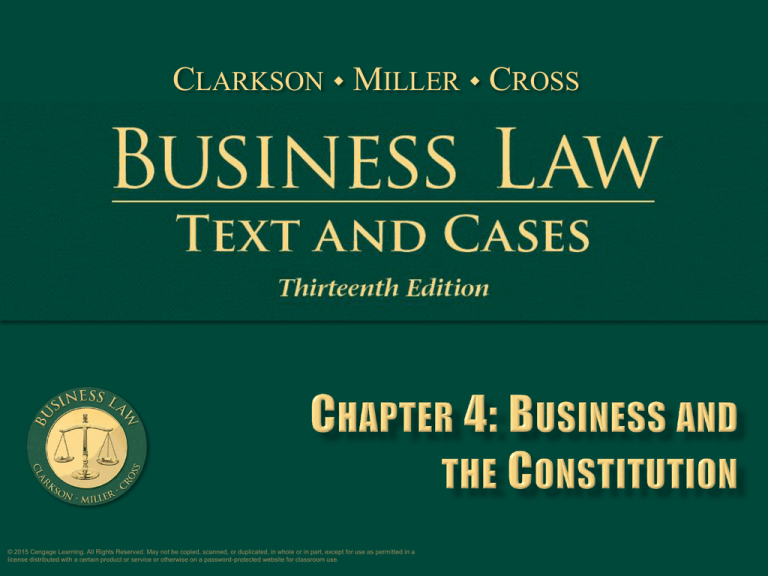
CLARKSON MILLER CROSS
© 2015 Cengage Learning. All Rights Reserved. May not be copied, scanned, or duplicated, in whole or in part, except for use as permitted in a
license distributed with a certain product or service or otherwise on a password-protected website for classroom use.
Before
the Revolutionary War,
States wanted a confederation
with weak national government
and very limited powers.
© 2015 Cengage Learning. All Rights Reserved. May not be copied, scanned, or duplicated, in whole or in part, except for use as permitted in a
license distributed with a certain product or service or otherwise on a password-protected website for classroom use.
2
After
the war ended, the States
voted to create a new, federal
government that shared power
with States.
© 2015 Cengage Learning. All Rights Reserved. May not be copied, scanned, or duplicated, in whole or in part, except for use as permitted in a
license distributed with a certain product or service or otherwise on a password-protected website for classroom use.
3
Federal
Form of Government:
Shares power between national and
state governments.
National government has limited,
enumerated powers delegated from
States.
© 2015 Cengage Learning. All Rights Reserved. May not be copied, scanned, or duplicated, in whole or in part, except for use as permitted in a
license distributed with a certain product or service or otherwise on a password-protected website for classroom use.
4
Regulatory
Powers of States.
10th Amendment.
Police Powers: order, safety, morals.
© 2015 Cengage Learning. All Rights Reserved. May not be copied, scanned, or duplicated, in whole or in part, except for use as permitted in a
license distributed with a certain product or service or otherwise on a password-protected website for classroom use.
5
Relations
Among the States.
Privileges and Immunities Clause.
• Art. IV §2 of the U.S. Constitution.
• Prevents state from imposing
unreasonable burdens on citizens –
particularly with regard to basic and
essential activities.
© 2015 Cengage Learning. All Rights Reserved. May not be copied, scanned, or duplicated, in whole or in part, except for use as permitted in a
license distributed with a certain product or service or otherwise on a password-protected website for classroom use.
6
Relations
Among the States.
Full Faith and Credit Clause (Art. IV
§1).
• Applies only to civil matters.
• Ensures that any judicial decision with
respect to such property rights will be
honored and enforced in all states.
© 2015 Cengage Learning. All Rights Reserved. May not be copied, scanned, or duplicated, in whole or in part, except for use as permitted in a
license distributed with a certain product or service or otherwise on a password-protected website for classroom use.
7
Separation
of Powers.
Federal government provides checks
and balances:
• Legislative (Congress): Creates laws.
• Executive (President/Agencies): Enforce
laws.
• Judicial (Courts): Interpret laws.
© 2015 Cengage Learning. All Rights Reserved. May not be copied, scanned, or duplicated, in whole or in part, except for use as permitted in a
license distributed with a certain product or service or otherwise on a password-protected website for classroom use.
8
The
Commerce Clause.
Power to regulate interstate
commerce defined in Gibbons v.
Ogden (1824): activities that
“substantially affect interstate
commerce.”
© 2015 Cengage Learning. All Rights Reserved. May not be copied, scanned, or duplicated, in whole or in part, except for use as permitted in a
license distributed with a certain product or service or otherwise on a password-protected website for classroom use.
9
The
Commerce Clause.
Expansion of Powers:
• In 1942, Supreme Court expanded
commerce clause to purely intrastate
businesses (Wickard v. Filburn).
© 2015 Cengage Learning. All Rights Reserved. May not be copied, scanned, or duplicated, in whole or in part, except for use as permitted in a
license distributed with a certain product or service or otherwise on a password-protected website for classroom use.
10
The
Commerce Clause.
Expansion of Powers:
• In 1964, Supreme Court prohibited
racial discrimination in interstate
commerce (Heart of Atlanta Motel v.
U.S.).
© 2015 Cengage Learning. All Rights Reserved. May not be copied, scanned, or duplicated, in whole or in part, except for use as permitted in a
license distributed with a certain product or service or otherwise on a password-protected website for classroom use.
11
The
Commerce Clause.
TODAY, the Commerce Clause
authorizes the national government
to regulate virtually any business
enterprise, including the internetbased. Limits: U.S. v. Lopez (1995).
© 2015 Cengage Learning. All Rights Reserved. May not be copied, scanned, or duplicated, in whole or in part, except for use as permitted in a
license distributed with a certain product or service or otherwise on a password-protected website for classroom use.
12
The
Commerce Clause.
Medical Marijuana.
• Some states have laws that legalize
marijuana for medical purposes.
• Supreme Court held that use of medical
marijuana does not insulate users from
federal prosecution (2005).
© 2015 Cengage Learning. All Rights Reserved. May not be copied, scanned, or duplicated, in whole or in part, except for use as permitted in a
license distributed with a certain product or service or otherwise on a password-protected website for classroom use.
13
The
“Dormant” Commerce Clause.
Generally, federal government has
exclusive authority to regulate
commerce that substantially affects
trade among the states.
© 2015 Cengage Learning. All Rights Reserved. May not be copied, scanned, or duplicated, in whole or in part, except for use as permitted in a
license distributed with a certain product or service or otherwise on a password-protected website for classroom use.
14
The
“Dormant” Commerce Clause.
States possess inherent police
powers to regulate health, safety,
public order, morals and general
welfare.
© 2015 Cengage Learning. All Rights Reserved. May not be copied, scanned, or duplicated, in whole or in part, except for use as permitted in a
license distributed with a certain product or service or otherwise on a password-protected website for classroom use.
15
The
“Dormant” Commerce Clause.
However, state police powers or
regulations that substantially
interfere with interstate commerce
will be struck down.
© 2015 Cengage Learning. All Rights Reserved. May not be copied, scanned, or duplicated, in whole or in part, except for use as permitted in a
license distributed with a certain product or service or otherwise on a password-protected website for classroom use.
16
The
“Dormant” Commerce Clause.
CASE 4.1 FAMILY WINEMAKERS OF
CALIFORNIA V. JENKINS (2010).
© 2015 Cengage Learning. All Rights Reserved. May not be copied, scanned, or duplicated, in whole or in part, except for use as permitted in a
license distributed with a certain product or service or otherwise on a password-protected website for classroom use.
17
The
Supremacy Clause and
Federal Preemption.
Article VI of the Constitution
provides that the Constitution,
laws, and treaties of the United
States are the “Supreme Law of
the Land.”
© 2015 Cengage Learning. All Rights Reserved. May not be copied, scanned, or duplicated, in whole or in part, except for use as permitted in a
license distributed with a certain product or service or otherwise on a password-protected website for classroom use.
18
The
Supremacy Clause and
Federal Preemption.
In case of direct conflict between
state and federal law, state law is
invalid.
© 2015 Cengage Learning. All Rights Reserved. May not be copied, scanned, or duplicated, in whole or in part, except for use as permitted in a
license distributed with a certain product or service or otherwise on a password-protected website for classroom use.
19
The
Supremacy Clause and
Federal Preemption.
A valid federal statute or
regulation will take precedence
over a conflicting state or local
statute.
© 2015 Cengage Learning. All Rights Reserved. May not be copied, scanned, or duplicated, in whole or in part, except for use as permitted in a
license distributed with a certain product or service or otherwise on a password-protected website for classroom use.
20
The
Supremacy Clause and
Federal Preemption.
Preemption occurs when Congress
chooses to act exclusively when
national and state governments
have concurrent powers
© 2015 Cengage Learning. All Rights Reserved. May not be copied, scanned, or duplicated, in whole or in part, except for use as permitted in a
license distributed with a certain product or service or otherwise on a password-protected website for classroom use.
21
Taxing
and Spending Powers.
• Article I, Section 8: Congress has the
“Power to lay and collect Taxes,
Duties, Imposts, and Excises” which
shall be “uniform” among the states.
• Expansion of commerce clause gives
taxing power as well.
© 2015 Cengage Learning. All Rights Reserved. May not be copied, scanned, or duplicated, in whole or in part, except for use as permitted in a
license distributed with a certain product or service or otherwise on a password-protected website for classroom use.
22
First
Ten Amendments to the
United States Constitution are
called the Bill of Rights.
All apply to natural persons and
most apply to business entities
as well.
© 2015 Cengage Learning. All Rights Reserved. May not be copied, scanned, or duplicated, in whole or in part, except for use as permitted in a
license distributed with a certain product or service or otherwise on a password-protected website for classroom use.
23
© 2015 Cengage Learning. All Rights Reserved. May not be copied, scanned, or duplicated, in whole or in part, except for use as permitted in a
license distributed with a certain product or service or otherwise on a password-protected website for classroom use.
24
Limits
on Federal and State
Actions.
Originally the Bill of Rights was a
limit on the national government’s
powers.
© 2015 Cengage Learning. All Rights Reserved. May not be copied, scanned, or duplicated, in whole or in part, except for use as permitted in a
license distributed with a certain product or service or otherwise on a password-protected website for classroom use.
25
Limits
on Federal and State
Actions.
Over time the Bill of Rights was
“incorporated” to States via the
due process clause of the 14th
Amendment.
Rights are not absolute.
© 2015 Cengage Learning. All Rights Reserved. May not be copied, scanned, or duplicated, in whole or in part, except for use as permitted in a
license distributed with a certain product or service or otherwise on a password-protected website for classroom use.
26
Freedom of Speech.
Right to Free Speech is the basis
for our democratic government.
Free speech also includes symbolic
speech, including gestures,
movements, articles of clothing.
© 2015 Cengage Learning. All Rights Reserved. May not be copied, scanned, or duplicated, in whole or in part, except for use as permitted in a
license distributed with a certain product or service or otherwise on a password-protected website for classroom use.
27
27
Freedom of Speech.
Reasonable Restrictions.
• Balance between government’s
obligation to protect, and citizen’s
exercise of rights:
• Content-Neutral Laws: aimed at
combating some social problems.
© 2015 Cengage Learning. All Rights Reserved. May not be copied, scanned, or duplicated, in whole or in part, except for use as permitted in a
license distributed with a certain product or service or otherwise on a password-protected website for classroom use.
28
Freedom of Speech.
Laws that Restrict Content of
Speech.
–Laws that restrict content, must have a
compelling state interest.
–CASE 4.2 Doe v. Prosecutor, Marion
County, Indiana (2013).
© 2015 Cengage Learning. All Rights Reserved. May not be copied, scanned, or duplicated, in whole or in part, except for use as permitted in a
license distributed with a certain product or service or otherwise on a password-protected website for classroom use.
29
Freedom of Speech.
Corporate Political Speech.
• In Citizens United v. Federal Election
Commission (2010) the Supreme
Court ruled that corporations can
spend freely to support or oppose
candidates for President and
Congress.
© 2015 Cengage Learning. All Rights Reserved. May not be copied, scanned, or duplicated, in whole or in part, except for use as permitted in a
license distributed with a certain product or service or otherwise on a password-protected website for classroom use.
30
Freedom of Speech.
Commercial Speech.
–Courts give substantial protection to
commercial speech (advertising).
Restrictions must: Implement substantial
government interest; directly advance that
interest; and go no further than necessary.
© 2015 Cengage Learning. All Rights Reserved. May not be copied, scanned, or duplicated, in whole or in part, except for use as permitted in a
license distributed with a certain product or service or otherwise on a password-protected website for classroom use.
31
Freedom of Speech.
Commercial Speech.
–CASE 4.3 BAD FROG BREWERY, INC. V.
NEW YORK STATE LIQUOR AUTHORITY
(2003).
© 2015 Cengage Learning. All Rights Reserved. May not be copied, scanned, or duplicated, in whole or in part, except for use as permitted in a
license distributed with a certain product or service or otherwise on a password-protected website for classroom use.
32
Freedom of Speech.
Unprotected Speech.
–U.S. Supreme Court has held that
certain speech is NOT protected:
defamatory speech, threatening
speech, and “fighting words.
© 2015 Cengage Learning. All Rights Reserved. May not be copied, scanned, or duplicated, in whole or in part, except for use as permitted in a
license distributed with a certain product or service or otherwise on a password-protected website for classroom use.
33
Freedom of Speech.
Unprotected Speech.
–Obscene Speech: Miller v. California
(1973), test for legal obscenity.
–Online Obscenity: CDA (1996), COPA
(1998), struck down by the Supreme
Court. CIPA (2000) was upheld.
© 2015 Cengage Learning. All Rights Reserved. May not be copied, scanned, or duplicated, in whole or in part, except for use as permitted in a
license distributed with a certain product or service or otherwise on a password-protected website for classroom use.
34
Freedom of Speech.
Unprotected Speech.
–Virtual Pornography. In 2003,
Congress passed the PROTECT Act,
making it a crime to real and ‘virtual’
porn of children.
© 2015 Cengage Learning. All Rights Reserved. May not be copied, scanned, or duplicated, in whole or in part, except for use as permitted in a
license distributed with a certain product or service or otherwise on a password-protected website for classroom use.
35
Freedom of Religion.
First Amendment may not
“establish” a religion or prohibit
the “free exercise” of religion.
© 2015 Cengage Learning. All Rights Reserved. May not be copied, scanned, or duplicated, in whole or in part, except for use as permitted in a
license distributed with a certain product or service or otherwise on a password-protected website for classroom use.
36
Freedom of Religion.
The Establishment Clause:
prohibits government from
establishing a state-sponsored
religion, or passing laws that favor
one over the other.
© 2015 Cengage Learning. All Rights Reserved. May not be copied, scanned, or duplicated, in whole or in part, except for use as permitted in a
license distributed with a certain product or service or otherwise on a password-protected website for classroom use.
37
Freedom of Religion.
The Free Exercise Clause
guarantees a person’s right to
freely exercise her religion.
• Employers must reasonably
accommodate beliefs as long as
employee has sincerely held beliefs.
© 2015 Cengage Learning. All Rights Reserved. May not be copied, scanned, or duplicated, in whole or in part, except for use as permitted in a
license distributed with a certain product or service or otherwise on a password-protected website for classroom use.
38
Freedom of Religion.
The Free Exercise Clause:
–Public Welfare Exception. When
religious practices work against
public policy and welfare,
government can act in protecting
the public.
© 2015 Cengage Learning. All Rights Reserved. May not be copied, scanned, or duplicated, in whole or in part, except for use as permitted in a
license distributed with a certain product or service or otherwise on a password-protected website for classroom use.
39
Searches and Seizures.
The Fourth Amendment:
• Requires search warrants to have
“probable cause.”
• General searches through personal
belongings are illegal.
• Search warrants must be specific.
© 2015 Cengage Learning. All Rights Reserved. May not be copied, scanned, or duplicated, in whole or in part, except for use as permitted in a
license distributed with a certain product or service or otherwise on a password-protected website for classroom use.
40
Searches and Seizures.
The Fourth Amendment:
• Generally business inspectors must
have a warrant.
• However, a warrantless search is
permissible for seizure of spoiled or
contaminated food.
© 2015 Cengage Learning. All Rights Reserved. May not be copied, scanned, or duplicated, in whole or in part, except for use as permitted in a
license distributed with a certain product or service or otherwise on a password-protected website for classroom use.
41
Fifth Amendment.
Guarantees no person can be
compelled to testify against himself
in a criminal proceeding.
Does not apply to corporations or
partnerships.
© 2015 Cengage Learning. All Rights Reserved. May not be copied, scanned, or duplicated, in whole or in part, except for use as permitted in a
license distributed with a certain product or service or otherwise on a password-protected website for classroom use.
42
Due
Process.
Procedural Due Process: any
government decision to take life,
liberty or property must be fair.
–Requires: Notice and Fair Hearing.
© 2015 Cengage Learning. All Rights Reserved. May not be copied, scanned, or duplicated, in whole or in part, except for use as permitted in a
license distributed with a certain product or service or otherwise on a password-protected website for classroom use.
43
Due
Process.
Substantive Due Process: focuses
on the content (the right itself).
–Fundamental Right: requires
compelling state interest.
–Non-Fundamental: rational
relationship to state interest.
© 2015 Cengage Learning. All Rights Reserved. May not be copied, scanned, or duplicated, in whole or in part, except for use as permitted in a
license distributed with a certain product or service or otherwise on a password-protected website for classroom use.
44
Equal
Protection.
– Government must treat similarly
situated individuals (or businesses)
in the same manner.
© 2015 Cengage Learning. All Rights Reserved. May not be copied, scanned, or duplicated, in whole or in part, except for use as permitted in a
license distributed with a certain product or service or otherwise on a password-protected website for classroom use.
45
Equal
Protection.
– Courts apply different tests:
• Strict Scrutiny – fundamental rights.
• Intermediate scrutiny.
• “Rational Basis” Test -economic
rights.
© 2015 Cengage Learning. All Rights Reserved. May not be copied, scanned, or duplicated, in whole or in part, except for use as permitted in a
license distributed with a certain product or service or otherwise on a password-protected website for classroom use.
46
Fundamental
right not
expressly found in the
constitution, but derived from
First, Fifth and Fourteenth
Amendments.
Laws and policies affecting
privacy are subject to the
compelling interest test.
© 2015 Cengage Learning. All Rights Reserved. May not be copied, scanned, or duplicated, in whole or in part, except for use as permitted in a
license distributed with a certain product or service or otherwise on a password-protected website for classroom use.
47
Federal
Statutes Affecting
Privacy Rights.
“Pretexting” for financial
information is illegal under GrammLeach-Bliley.
Privacy Act of 1974.
HIPAA of 1996.
USA PATRIOT Act of 2001.
© 2015 Cengage Learning. All Rights Reserved. May not be copied, scanned, or duplicated, in whole or in part, except for use as permitted in a
license distributed with a certain product or service or otherwise on a password-protected website for classroom use.
48


